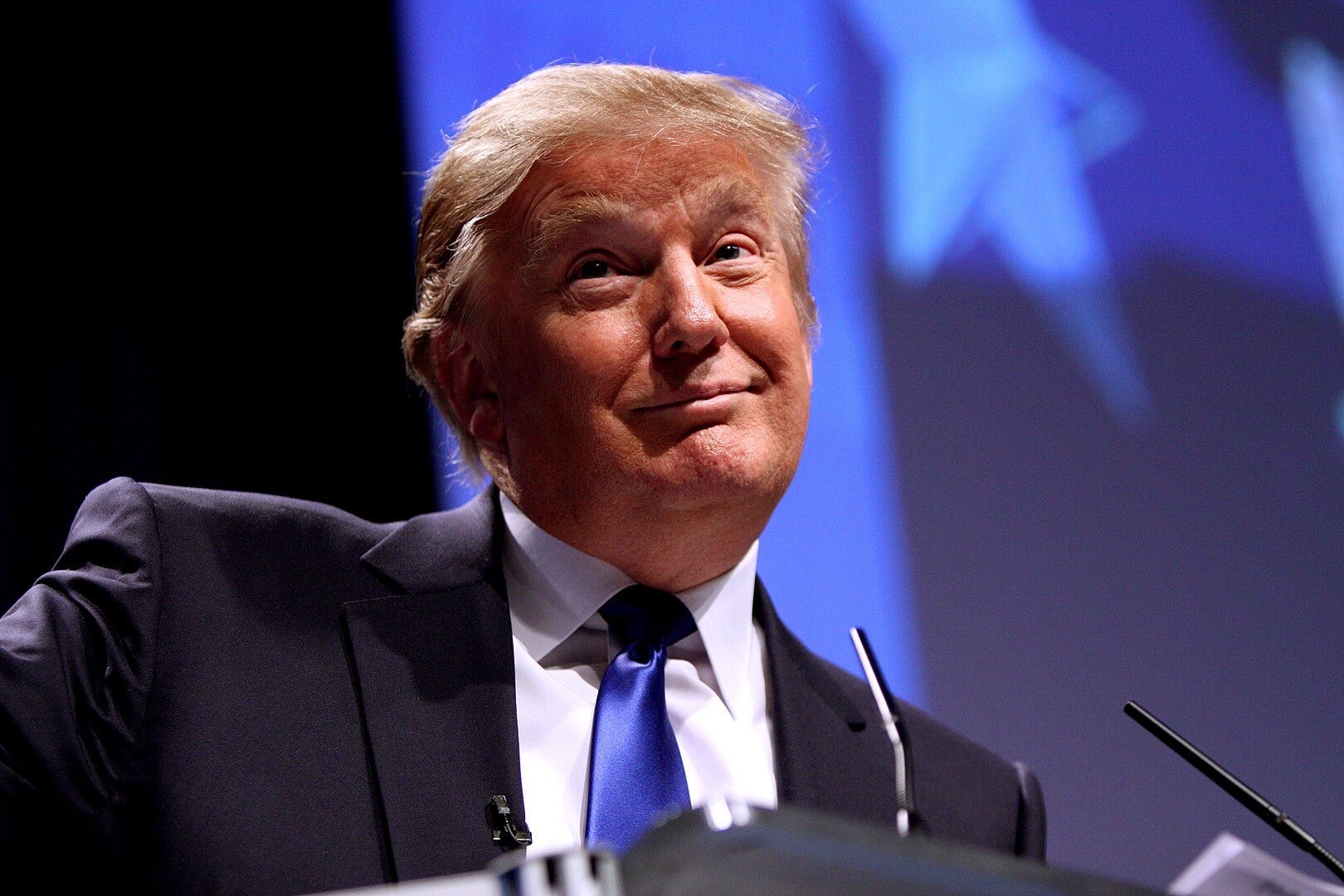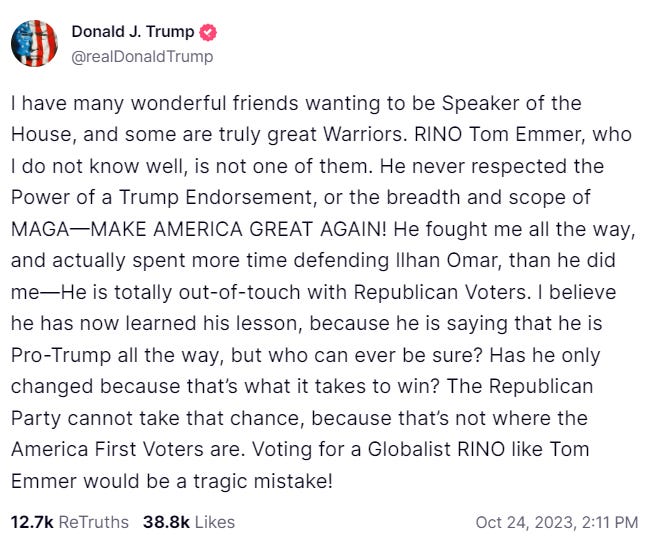|
 |
Is a Donald Trump Candidacy the Only Path to GOP Unity?
The House speaker fight proved the unique sway Trump continues to hold over the Republican Party
Until a week ago, new speaker of the House Mike Johnson was an obscure congressman from Louisiana who had never chaired a committee and never held a role in GOP leadership. If he was known for anything, it was for being the vice chair of the House Republican Conference and for leading an effort to challenge and overturn the 2020 election results. He wasn’t the obvious first choice, but he was ultimately the most palatable to the warring factions of the GOP.
The House GOP’s decision to ultimately coalesce behind Johnson was due more to exhaustion than genuine unity. After three weeks of chaos, three failed speaker nominations and lots of backstabbing, the moderate wing of the party gave in, deciding they would rather have a speaker from the right wing of the party than endure more intraparty turmoil. There’s no doubt that beneath the GOP’s performative unity bubbles a deep ideological rift and bitter political resentment.
But now, after nearly a month of breathless coverage, we can finally move on from the palace intrigue that’s been eating up an outsized portion of media attention. Before moving on completely, though, it would be worthwhile to pause and examine what the speaker fight has revealed about the modern Republican Party and what that means for the 2024 presidential election.
Trumping the GOP Field
The most urgent question arising from the chaos of the last three weeks is whether the 2024 GOP nominee will be able to unify the disparate wings of the party. If not, he or she will have little chance of overcoming Joe Biden to take the White House, no matter how far the president’s approval rating falls. In other words, party unity is a necessary condition for the GOP to win the presidential election: No candidate can expect to triumph in the general election without it.
Ultimately, whether or not the GOP is capable of such unity depends chiefly on one question: Does the party nominate Donald Trump or someone else? Let’s first consider a situation in which Trump is the nominee. Seeing as that Trump leads nationwide and early state polling by 30 to 40 percentage points over his nearest challenger, this seems to be the most likely scenario. If this happens, the GOP’s problem of party unity will likely evaporate. That’s because Trump is still the undisputed leader of the party, the one person who can unite most of the factions of the modern GOP.
If this isn’t evident by Trump’s overwhelming dominance in the primary polls, just look at the role that Trump played in the House speakership fight. After Speaker Kevin McCarthy had been deposed by the party’s right flank, the party nominated, and then subsequently rejected, Reps. Steve Scalise and Jim Jordan, leaving the conference in a stalemate with no clear choice for leader. One promising option was Tom Emmer, the House GOP’s third-ranking member, who is regarded as more of a political moderate than either Scalise or Jordan. Unlike many of his peers, Emmer rebuffed Trump in voting to certify the 2020 election.
That last deed is ultimately what did Emmer in. Ahead of the House vote on Emmer, Trump took to his social media site Truth Social:
Within hours, Emmer had dropped out of the race, knowing that, without Trump’s backing, his quest was doomed. What this saga suggests is that Trump is still the de facto leader of the GOP, and that he still commands enough support from the Republican base that the party’s official organs and elected officials have no choice but to follow his lead. If he is selected as the party’s presidential nominee next year, it’s difficult to imagine more than a few rogue party members refusing to get behind him. In the end, if Trump is the GOP nominee, the party will fall in line just the way it has for the last seven years.
The Road to GOP Disarray
Now, let’s consider a situation in which someone other than Trump is the nominee. That may look like a long shot, but it’s not altogether impossible. Political campaigns are unpredictable, and there have been plenty of upsets in recent political history.
If that does happen, however, any chance of party unity will all but evaporate. It doesn’t matter whether the nominee is someone from the more populist wing of the party, like Ron DeSantis, or someone from the old-school wing of the party, like Nikki Haley. If the GOP nominates anybody other than Trump, the party will face internal schisms and power struggles that will doom any chance of party unity.
For one thing, it’s impossible to imagine Trump losing and then throwing his support behind any of the other nominees. We have ample proof that Trump is not the kind to go down graciously, and there’s no chance his ego would allow him to become another candidate’s cheerleader. All the available evidence suggests that were Trump to lose the nomination, he would claim that the process was fraudulent and go to war against the GOP, either by mounting an independent bid or by telling his supporters not to vote Republican. And since Trump has a lock on 20%-30% of the GOP base, such a situation would be a disaster for the GOP’s electoral prospects.
But even if Trump isn’t around to spark a civil war within the party (due to, say, a serious health event or a prison sentence), it’s difficult to imagine the GOP successfully papering over the dividing lines that remain within the party. After all the turbulence within the House GOP Conference over the last year and a half—from McCarthy’s initial 15-round effort to become speaker to the most recent standoff between the hardline conservatives and moderates—it’s become clear that there remain deep divides within the party nobody other than Trump has ever managed to reconcile.
It might be ironic that the only person who has demonstrated the ability to get the party to overcome its divisions is the same person who brought them to the surface in the first place back in 2016. But the fact remains that Trump alone has shown the ability to unify the deeply divided wings of the contemporary GOP. Without him as the nominee, the GOP would be doomed to suffer the same kind of conflict and chaos in the 2024 presidential election that was on display in the House for the better part of October.
You’re currently a free subscriber to Discourse .



